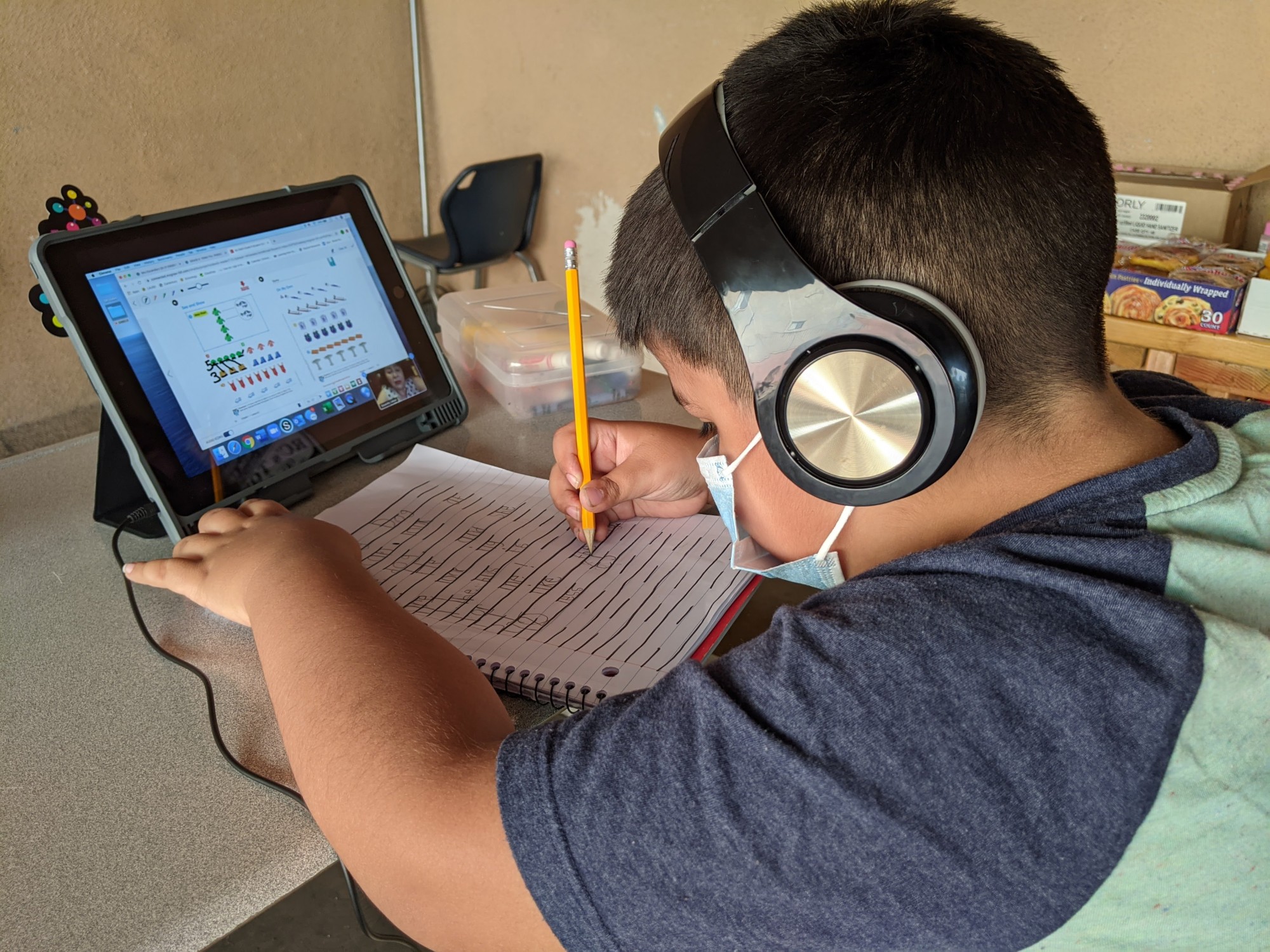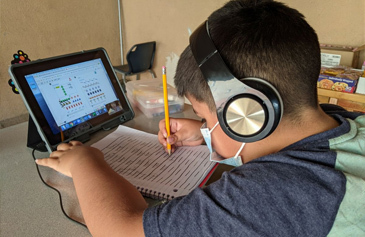Through UCLA course, students deliver funding to L.A. nonprofits

Young boy with school workbook and tablet computer
Philanthropy as Civic Engagement class has distributed $780,000 to local organizations over past decade
Thanks to an unusual undergraduate course at UCLA, students have distributed hundreds of thousands of dollars over the past decade to Los Angeles nonprofits.
The latest edition of the class, Philanthropy as Civic Engagement, concluded in June. Students distributed funds to three beneficiaries: Open Paths Counseling Center, which received $40,000 toward training clinicians to support the mental health needs of underserved communities; School on Wheels, which received $25,000 to provide laptops for homeless K-12 students; and Jazz Hands for Autism, which received $15,000 to provide musical training, career support and advocacy for musicians who have autism.
And since 2012, when the course was first offered, students have distributed a total of $780,000 to 27 local organizations.
The course enables students to explore their sense of responsibility to care for and improve their communities. While many of the students are already engaged in volunteerism, the experience provides a different perspective, introducing them to the process that individuals and grantmaking organizations go through when deciding how to allocate their charitable giving.
“People sometimes assume that to be philanthropic, you must be abundantly wealthy,” said Jennifer Lindholm, UCLA’s assistant dean of undergraduate education, who has led the course’s teaching team for the past five years. “That mindset can disempower us from engaging actively to strengthen our communities.
“Through this course, we aim to help students understand the work of nonprofit organizations, consider different perspectives on philanthropic giving, and challenge themselves to consider the myriad ways they can contribute — both now and in the future — to enhancing the common good.”
The money the students give away is provided by UCLA donors who have chosen to invest in cultivating a new generation of philanthropists. Since 2019, the course has been supported by Women & Philanthropy at UCLA, which continues to raise funds toward the class endowment.
In the 2021 class, students were divided into eight-person groups, each of which researched a pool of 14 potential nonprofit beneficiaries. Based on what they learned, each group chose eight semifinalists and held meetings with those organizations’ leaders.
One of those meetings was especially meaningful for Adriana Perez, a psychology major from Chatsworth, California, who is studying how to make mental health resources more accessible. During an online interview with representatives from Open Paths, Perez said, she connected deeply with the counseling center’s mission. But she had never before seen herself as a philanthropist.
“The ability to grant a real monetary award was incredibly empowering in that, as a class, we were able to decide what issues were most important to us, and the ability to encourage change was within our hands,” she said. “Philanthropy was not an area I thought I would ever be involved in, but this course definitely changed my perspective.”
Following those meetings, each group zeroed in one nonprofit as its chosen beneficiary, and presented a funding proposal for that organization to the other students in the class. A class-wide vote determined how much of the class’s total funds should go to each of the three organizations.
Students are free to consider and debate which criteria are most important to their funding decisions. In the latest iteration of the course, which ended in June, some students prioritized pandemic emergency relief, while others were more concerned with programs’ long-term viability or organizations’ prospects for sustained growth. Most were focused on social justice and equity.
Johnny Perez, a psychology major from Whittier, California, was a member of this year’s class. One of his long-term goals is to open a drug treatment center, and he took the course to better understand how funding decisions are made, which could come in handy when he seeks financial backers for his own nonprofit.
Course discussions helped him realize that all of his classmates had their own perspectives and priorities.
“We all had different views, and one was not necessarily better than the other,” Perez said. “I wanted to listen to other people’s views, to have the ability to want to learn and expand, and learn about other people’s values.”
Michael Lima-Sabatani is a public affairs major from Yorba Linda, California, with an interest in organizational governance. He said the course provided real opportunities to evaluate how his and his classmates’ skill sets could determine who was best equipped to serve certain roles on the team.
“I had done a lot of research on one organization and was passionate about it, but from listening to the other presentations, I knew one particular classmate would be the best advocate and presenter,” he said. “She had the most poise and was the best storyteller. And I took on an editorial position, which I know was a good fit for my writing skills.”
Lima-Sabatini said he also appreciated the opportunity to meet with leaders of the nonprofits he researched. “Gaining the first-hand experience in a setting where you are being supported was super valuable,” he said.
For other students, the course highlighted the importance of diversity in philanthropy.
“Being in this position gave me a lot of insight into philanthropy, and how diversity in board rooms is a hugely important issue,” said Aaron Tann, a communications major from Baldwin Park, California. “Different communities have different needs, perspectives and diverse opinions. We also need that diversity at the highest level of power where money is being distributed.
“A lot of us think we know what a community needs, but the organizations that are hands on with the community have a much better idea about the best use of the money.”
Armed with insights like that, those who completed the 2021 edition of the course have already laid the groundwork for the UCLA students who will take the class after them. Damola Adeyemo, a physiological science major from Rancho Cucamonga, California, shared her thoughts in an open letter that will be shared with students who might enroll in the 2022 class.
“This UCLA class is very different and you will be astonished by how much you will grow in 10 weeks. I do not think I will ever have another class as unique and exciting as this one in my time as an undergraduate.”
Raves from the beneficiaries
“It was a great experience working with the students. They were fully engaged in the project and asked questions to deeper their understanding of the work we do.”
– Charles Evans, executive director, School on Wheels
“It was a pleasure working with the Philanthropy as Civic Engagement class. They were very thoughtful and professional in their approach and inquiry. Their enthusiasm for our work was palpable, which made working with them an absolute delight.”
– Sierra Smith, executive director, Open Paths
“Working with the UCLA Philanthropy as Civic Engagement students was an incredible and emotional experience. Through their interviews and questions, the students were able to construct a cohesive narrative about the work JHFA does that I don’t think would have been possible without their help.”
– Ifunanya Nweke, executive director, Jazz Hands for Autism
This article, written by Elizabeth Kivowitz, originally appeared in the UCLA Newsroom.




